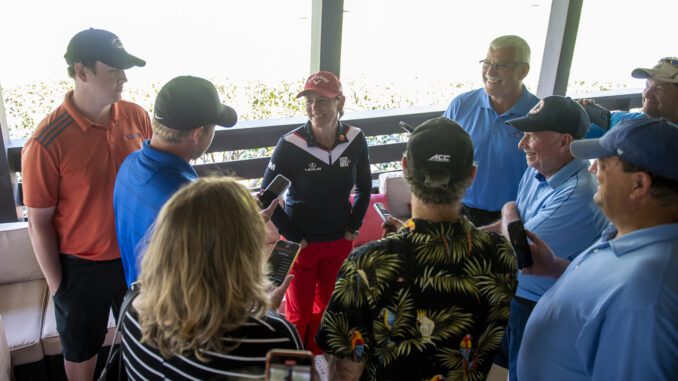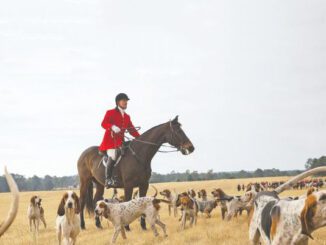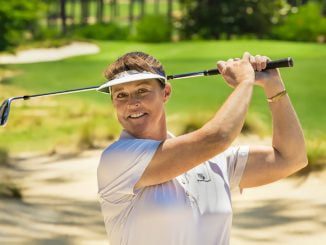
SOUTHERN PINES — Annika Sorenstam was born in Sweden and lives in Florida. But when she set foot on the property at Pine Needles Lodge & Golf Club for last week’s U.S. Women’s Open media day, it felt like a homecoming for the World Golf Hall of Famer.
“There’s a friendly family feeling and the environment is very nice,” she said. “But it’s also quite laid back, and that’s what I really like.”
Sorenstam’s love for Pine Needles was kindled in 1996 when she formed a bond with the resort’s matriarch Peggy Kirk Bell — who used to call her Heineken because she couldn’t pronounce her actual name — while practicing for the first U.S. Women’s Open to be played there.
It blossomed later that summer when she solidified her claim to stardom by winning her second straight Open title.
A lot has changed since then.
Bell is gone, having passed away in 2016 at the age of 95. The course underwent a facelift a year later, with noted designer Kyle Franz widening fairways, reworking several greens and adding some native waste areas.
Sorenstam has all but disappeared from competitive golf, having “stepped away” in 2008 to start a family.
Through it all, the lure of Pine Needles has never faded. That’s why the 51-year-old mother of two has chosen to return for her first Open appearance in 14 years. She earned the invitation by winning the U.S. Senior Women’s Open in her first attempt last August.
It’s an opportunity she said she probably wouldn’t have accepted had the tournament been scheduled anywhere else.
“No, I would not,” she said. “I’m pretty sure about that.”
Sorenstam’s dominant win in 1996, in which she lapped the field by finishing six shots ahead of everyone else, set a tone for future major championships at Pine Needles.
The other two Women’s Opens held there were won by one fellow Hall of Famer and another player whose 20 career wins and two majors will eventually get her enshrined — Karrie Webb in 2001 and Christie Kerr in 2007.
Because of her age, decreased length off the tee and lack of recent activity, Sorenstam holds no delusions of winning or even contending in her return — even though the course, at 6,638 yards, is set up to play 26 yards shorter this year than it did for its previous Opens.
“I’m learning to adjust,” she said. “I’m not happy mentally about it, but it is the reality of what it is. I’ll just keep on plugging and hopefully with some good feel around the greens, it will all come back.
“This is not really my bread and butter anymore. It’s more just going out and having a good time, so I don’t feel any pressure. Memories come back. When you get a little older, you think about the journey more than the destination.”
As her son Will not-so-tactfully pointed out recently, her current age is the same as the combined age of sisters Nelly and Jessica Korda, two of the top players in the game today.
That doesn’t mean Sorenstam is coming back to Pine Needles for a ceremonial victory lap.
“I am very competitive, but I need to keep my competitive level to what I’m capable of doing,” she said. “If I can just play my golf, I’ll be happy.”
Sorenstam doesn’t need any more trophies to validate her legacy.
Her 90 tournament victories worldwide are the most ever by a female golfer. She has won 10 majors, including three U.S. Women’s Opens, eight LPGA Player of the Year awards and six Vare Trophies for the lowest scoring average in a season.
She is the only woman to shoot a 59 in competition and was the first to play against the men in a sanctioned PGA Tour event when she teed it up at the Colonial in 2003.
As impressive as that resume is, they were little more than numbers on a sheet of paper to Sorenstam’s children, who both came along after her retirement.
Because 12-year-old Ava and 11-year-old Will had only experienced their mother’s golf prowess through YouTube videos and practice rounds together, they were the inspiration for her decision to play competitively again.
Just don’t call what she’s doing a comeback.
“This is not necessarily about me trying to do a comeback,” she said. “It was more about the family. They wanted me to play. So it’s very special.”



